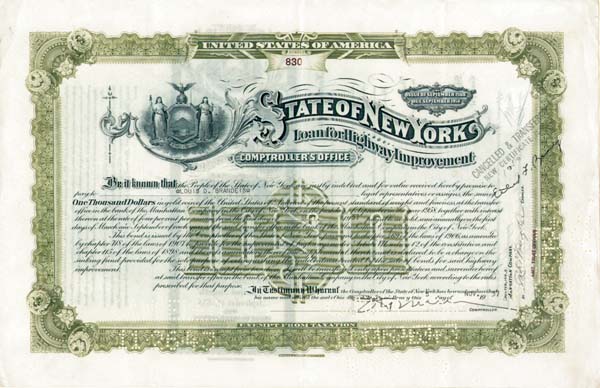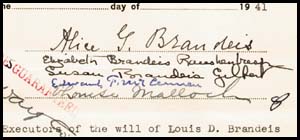Louis D. Brandeis - State of New York- $1,000 Bond
Inv# AG1134 Bond


This 1930's $1,000 Bond of the State of New York Loan for Highway Improvement is issued to Brandeis and is signed by the Trustees of his Estate including 3 Brandeis relatives including Alice G. Brandeis on a separate transfer document dated 1941. Excellent Condition. Rare!
In 1872 and in part due to economic misfortunes associated with Reconstruction and the coming depression, Adolph sold off the Brandeis business holdings and the family left Louisville for an extended stay in Europe. While abroad, Brandeis failed at his first go of a European education, falling short of the admission standards of the Vienna Gymnasium. For some months thereafter, Brandeis traveled widely with his father and brother. Attending the Annen-Realschule in Dresden, Germany, during the years 1873 to 1875, he again received commendations from the faculty.
Upon his return to America in 1875, Brandeis opted for a career in law, influenced in part by his uncle Lewis Dembitz, a noted Louisville attorney (who served as such a positive role model that Brandeis would later change his middle name from David to Dembitz). He applied to and was accepted by Harvard Law School, where he enrolled just shy of the age of 19, without any prior formal higher education. Brandeis did exceptionally well in the law program; despite Harvard’s rule that one must be 21 years of age to obtain a legal degree, Brandeis graduated in 1877 as class valedictorian. After practicing law briefly in St. Louis with his brother-in-law James Taussig, Brandeis returned to Boston and established the firm Brandeis-Warren in 1879 with a fellow student from Harvard, Samuel D. Warren.
On a visit home to Louisville in 1890, Brandeis met distant cousin Alice Goldmark, had a brief courtship, and was married on March 23, 1891. They had two daughters.
The partnership between Brandeis and Warren proved very successful; the Boston firm soon attracted both a solid reputation and a significant client base. After the departure of Sam Warren from the firm, Brandeis remained the senior partner of Brandeis, Dunbar & Nutter until he left for Washington in 1916.
While in the early years of his career in Boston, Brandeis developed both the interest and talent for public advocacy that would color the remainder of his life. The “people’s attorney” began to devote more and more of his professional time to supporting the cause of the socially and economically disadvantaged, articulating a set of beliefs that would guide him in later life: the preservation of the individual’s right to fair treatment in work and law, and the right to be “left alone” by both the forces of government and big business. He was a Justice of the Supreme Court becoming the first man of Jewish decent to sit on the court. In 23 years on the bench, he was known chiefly as a dissenter. Brandeis University founded in 1947, was named for him.
Brandeis stepped onto the national stage with his involvement in the New Haven Railroad merger controversy. J.P. Morgan sought to consolidate his control over New England rail lines through a merger of his New York, New Haven and Hartford Railroad company with the Boston & Maine Railroad. To Brandeis, this smelled of a monopoly that could ultimately threaten the consumer. From 1905 to 1914 he waged a legal fight to oppose Morgan’s efforts in the region.
A bond is a document of title for a loan. Bonds are issued, not only by businesses, but also by national, state or city governments, or other public bodies, or sometimes by individuals. Bonds are a loan to the company or other body. They are normally repayable within a stated period of time. Bonds earn interest at a fixed rate, which must usually be paid by the undertaking regardless of its financial results. A bondholder is a creditor of the undertaking.










Ebay ID: labarre_galleries